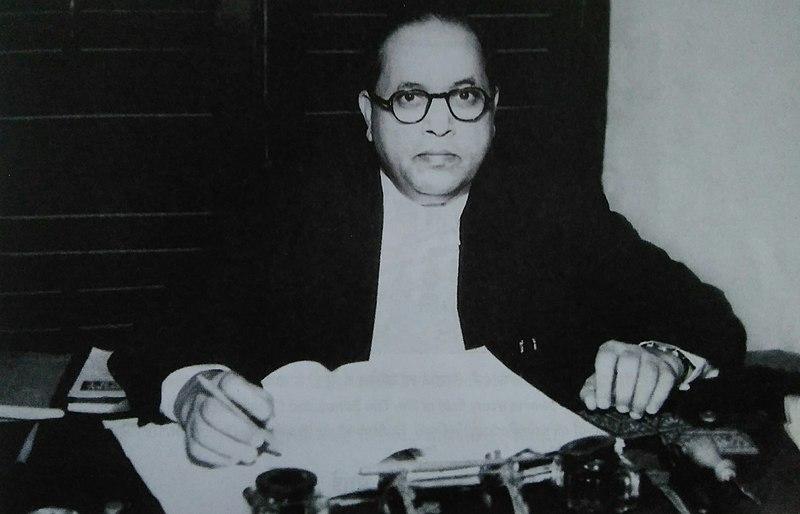Ambedkar’s Vision Demolished by Majoritarianism as India Observes his Death Anniversary

Dr Babasaheb Ambedkar. Image Courtesy: Wikimedia Commons
Uniting people and the nation by breaking the barriers of caste, creed, gender and language and forging solidarity and amity in the face of graded social and economic inequality was central to the life and work of BR Ambedkar. That is why he boldly declared that the caste system is anti-national and passionately pleaded and worked for its annihilation.
It is well known that many outstanding leaders of our country interpreted nationalism in terms of our freedom from British rule and reconstruction of society by sternly dealing with many internal, social and economic problems plaguing it.
Ambedkar, with his deep understanding of caste inequality and untouchability, became the first leader to have interpreted caste as a threat to nationalism and fraternity and outlined social, economic and legal measures to promote unity.
His famous statement “Fraternity is another name for democracy” amply brought out his bold vision of a social order rooted in equality, unity, fellowship, reconciliation and understanding. He struck at the root of disunity manifested in an unequal social order strengthened by the perpetuation of caste hierarchy through many social practices and regressive customs.
Ambedkar went beyond ‘one man, one vote’ and stressed ‘one man, one value’ for forging deeper bonds of unity of all irrespective of social and economic status. His epoch-making measures to promote fraternity and unify society had a huge gender dimension.
His ideal of unity was very broad, wide-ranging and inclusive. It included the unity of people of diverse faiths and castes as much as the equality of men and women. In drafting the Hindu Code Bill, the defining features of which were gender equality and women’s empowerment, he proved his credentials as a protagonist of a social order informed by fair and equal treatment of women.
In fact, Ambedkar passionately argued for the passage of the Hindu Code Bill to put an end to patriarchy in Hindu society. He did so on the basis of law and jurisprudence as much as on ancient wisdom of some Hindu scriptures which he quoted in the defence of the rights of women to own property and promote monogamy.
His quoting of some Hindu scriptures was instructive as he was prohibited from reading them on the ground that he was a so-called untouchable and pleaded with Hindu leaders opposed to women’s equal rights to honour the scriptural injunctions in their favour.
In granting equality and equal opportunity for women, he was bolstering the unity of India, which was deprived of women’s immense contribution due to their subordinate role even as they laboured hard within the patriarchal social order.
In his book Thoughts on Linguistic States, Ambedkar wrote: “Minority communities may be crushed. If not crushed, they may be tyrannised and oppressed. They are sure to be discriminated against and denied equality before the law and equal opportunity in public life.”
On the solemn occasion of the anniversary of his Parinirvan on December 6, we need to be poignantly mindful that his words have come true. Sixty-six years after his death, India is confronted with a dire situation shaped by the politics of targeting and tyrannising minorities.
In the context of the sinister call issued by some legislators of the Bharatiya Janata Party (BJP) and other leaders of several Hindutva organisations for a comprehensive social and economic boycott of Muslims one is reminded of Ambedkar’s draft Constitution of 1945 for the United States of India.
In that draft, he provided in the chapter on Fundamental rights that any call or measure for a social and economic boycott of minorities would be visited with stringent punishment.
Ambedkar also submitted a memorandum on Fundamental Rights to the Constituent Assembly in March 1947. In that memorandum, he also included the possibility of calls for a social and economic boycott of minorities or any other community and pleaded for deterrent penal measures against those who issued such a call.
How prescient was he to see through the times when such a devious call for the boycott of Muslims is being issued with impunity by Hindutva leaders. We are confronting the monster in a ‘New India’ conjured up by Prime Minister Modi’s silence on such issues. Ambedkar’s vision is urgently needed to salvage India and any efforts in this direction would be a fitting homage to him.
The writer was officer on special duty and press Secretary to President KR Narayanan. The views are personal.
Get the latest reports & analysis with people's perspective on Protests, movements & deep analytical videos, discussions of the current affairs in your Telegram app. Subscribe to NewsClick's Telegram channel & get Real-Time updates on stories, as they get published on our website.
























